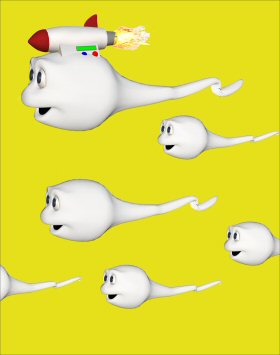

Home Page
The latest articles, features and news.


Read About...


Search Articles



Discussion Forums




|
| | |
|
21 February 2011
Fertility; it's in your bones, not your boner
by George Atkinson  Scientists have found an altogether unexpected connection between a hormone produced in bones and male fertility, reports the journal Cell. The researchers, from Columbia University, say the skeletal hormone known as osteocalcin boosts testosterone production to support the survival of the germ cells that go on to become mature sperm.
Scientists have found an altogether unexpected connection between a hormone produced in bones and male fertility, reports the journal Cell. The researchers, from Columbia University, say the skeletal hormone known as osteocalcin boosts testosterone production to support the survival of the germ cells that go on to become mature sperm. Bone was once thought of as a mere assembly of inert calcified tubes, but lately, scientists have gained a much better picture of bone as a true endocrine organ, with links to energy metabolism and reproduction. Prior work on skeletal ties to reproduction had focused primarily on the reproductive organs as a regulator of bone remodeling. That led Columbia's Gerard Karsenty to wonder whether the influence might go the other way as well. Given the links between menopause and osteoporosis, Karsenty anticipated such a connection would more likely turn up in females. But that's not what they found at all. "We found that the bones do control reproduction, but only in males," Karsenty said. "That was obviously a surprise, but that's the finding."
In animal matings between normal females and osteocalcin-deficient males, the litters produced were smaller and less frequent. Males lacking a gene that inhibits osteocalcin's endocrine functions showed just the opposite: larger and more frequent litters. The finding may provide insights into some forms of male infertility. "Male subfertility with no apparent cause is a well-known condition," Karsenty said. He added that researchers may now begin looking for evidence that mutations in osteocalcin or its receptor might be responsible in some of those cases. Related:
Childhood diet affects adult fertility
Changes To Sperm DNA Could Be Cause Of Most Male Infertility
Older Men's Sperm Often Damaged Source: Cell
|
|





